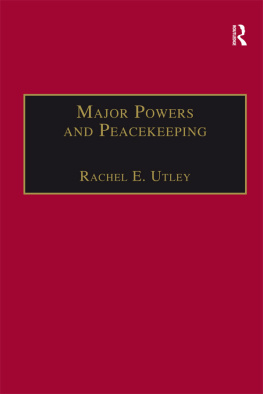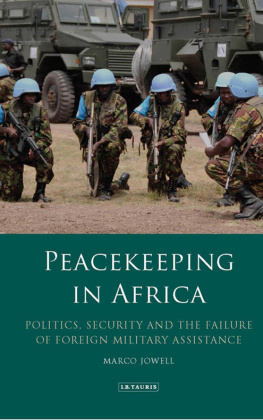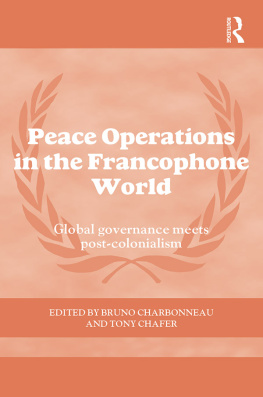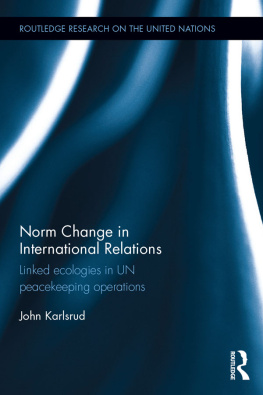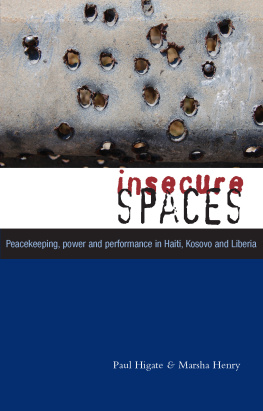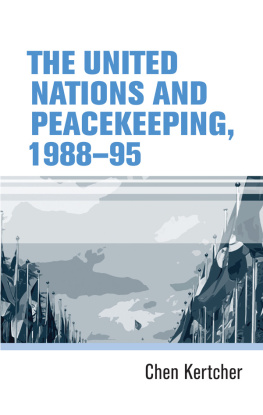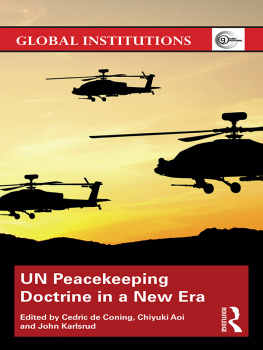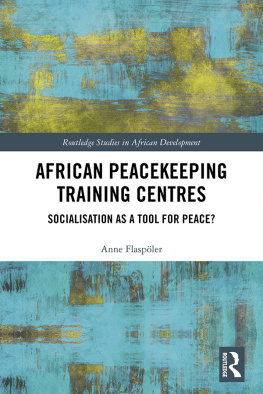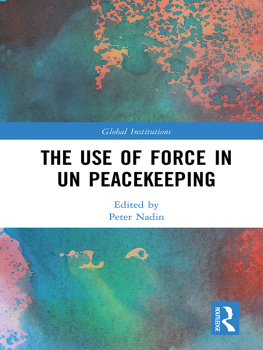First published 2006 by Ashgate Publishing
Published 2016 by Routledge
2 Park Square, Milton Park, Abingdon, Oxon OX14 4RN
711 Third Avenue, New York, NY 10017, USA
Routledge is an imprint of the Taylor & Francis Group, an informa business
Copyright 2006 Rachel E. Utley
Rachel E. Utley has asserted her right under the Copyright, Designs and Patents Act, 1988, to be identified as the editor of this work.
All rights reserved. No part of this book may be reprinted or reproduced or utilised in any form or by any electronic, mechanical, or other means, now known or hereafter invented, including photocopying and recording, or in any information storage or retrieval system, without permission in writing from the publishers.
Notice:
Product or corporate names may be trademarks or registered trademarks, and are used only for identification and explanation without intent to infringe.
British Library Cataloguing in Publication Data
Major powers and peacekeeping: perspectives, priorities
and the challenges of military intervention
1.Peacekeeping forces 2.Intervention (International law)
3.Conflict management 4.International relations 5.World
politics - 21st century
I.Utley, R. E., 1972
327.1'72
Library of Congress Cataloging-in-Publication Data
Major powers and peacekeeping: perspectives, priorities and the challenges of
military intervention / edited by Rachel E. Utley.
p. cm.
Includes index.
ISBN 0-7546-4033-7
1. Peacekeeping forces. 2. Great powers. I. Utley, R. E., 1972-
JZ6374.M34 2005
341.5'84--dc22
Transfered to Digital Printing in 2011
2005024899
ISBN 9780754640332 (hbk)
Ali M. Ansari is Reader in Modern History with reference to the Middle East at the University of St Andrews, and Associate Fellow of the Middle East Programme, Royal Institute of International Affairs. His principal publications include Modern Iran since 1921: The Pahlavis and after (London; Longman, 2003); Iran, Islam and Democracy The Politics of Managing Change (London; RIIA, 2000 [2nd edition, 2005]); 'Cultural Transmutations: The Dialectics of Globalisation in Contemporary Iran,' in T. Dodge and R. Higgot (eds), Globalisation and the Middle East: Economy, Society and Politics (London; RIIA, 2002); 'Iranian Foreign Policy under Khatami: Reform and Reintegration,' in A. Ehteshami and A. Mohammadi (eds), Iran and Eurasia (Reading; Ithaca Press, 2000); 'Continuous Regime Change from Within,' The Washington Quarterly , 26, 4 (2003), pp. 53-68; and 'The Myth of the White Revolution: Mohammad Reza Shah, "modernisation" and the consolidation of power,' in Middle Eastern Studies , 37, 3, (2001) pp. 1-24.
Richard P. Cousens, OBE is head of the Revolutionary Warfare and Counter-Insurgency Programme for the Centre for Defence and International Security Studies, based in Henley-on-Thames. He was formerly Director of Defence Studies for the British Army and was intimately involved with the evolution of British and American Peacekeeping Doctrine. He served at Headquarters US Army Training and Doctrine Command for three years during the evolution of concepts for a digitised army.
Isabelle Facon is a former Senior Associate Member at Saint Antony's College, University of Oxford. She has worked as a research fellow at the Fondation pour la Recherche Stratgique, a Paris-based think-tank, since 1991. In this position, she has developed thorough expertise on Russia's foreign and security policies, and has published extensively on these issues. Isabelle Facon also has strong teaching experience. She conducts the 'Geopolitics of Russia' seminar at the Collge interarmes de dfense (Cid), as well as a seminar on 'World Politics' at Institut catholique de Paris . She is a lecturer on Russia and CIS issues in the framework of the regional sessions of Institut des hautes tudes de dfense nationale (Ihedn).
David J. Francis holds a doctorate from the University of Southampton, and is Director of the Africa Centre for Peace and Conflict Studies at the University of Bradford. He has written extensively on economic and security regionalism in Africa, and his most recent publications include The Politics of Economic Regionalism: Sierra Leone in ECOWAS (Aldershot; Ashgate, 2001); and (with Mohamed Faal, Alex Ramsbotham and John Kabia) Dangers of Co-deployment: UN Cooperative Peacekeeping in Africa (Aldershot; Ashgate, 2004). He has consulted for the UN and a variety of African intergovernmental agencies and civil society organisations on peace, security, post-conflict transition, conflict management and resolution.
Owen A. Hartley was born in Scunthorpe, Lincolnshire, and attended St Peter's and Nuffield Colleges, Oxford, where he took his BA and DPhil, He has held teaching posts at the University of Leeds since 1968 in Politics, International Studies, and the School of History, where he is currently Senior Teaching Fellow. He has published on British government topics but has mainly taught international politics and especially strategic studies, where his main interest has been in the evolution of military doctrines. Dr Hartley is manned with two, now adult, children. He confesses with some amusement that his hobby is reading about the subjects he teaches and researches, being paid an academic salary to follow his own inclinations.
Alpaslan zerdem holds a doctorate from the University of York. He teaches in the areas of post-conflict recovery and politics of humanitarian ism. He is Director of the MA in Post-war Recovery Studies in the Department of Politics' Post-war Reconstruction and Development Unit (PRDU) at the University of York. With field research experience in Afghanistan, Bosnia-Herzegovina, El Salvador, Kosovo, Sierra Leone, Sri Lanka and Turkey, his research interests centre around post-conflict reconstruction, disaster management ( Disaster Management and Civil Society: Earthquake Relief in Japan, Turkey and India with T. Jacoby, I.B. Tauris, 2005), and reintegration of former combatants ( A Farewell to Arms on the Threshold of Peace: Reintegration of Former Combatants , forthcoming, I.B. Tauris).
Gary D. Rawnsley was formerly Director of the Institute of Asia-Pacific Studies at the University of Nottingham. He is now Professor and Head of International Studies at the University of Nottingham Ningbo China (UNNC). A specialist on political communication in Taiwan, China and Hong Kong, his recent publications include Political Communications and Democracy (London; Palgrave, forthcoming); Critical Security, Television and Democratisation in Taiwan (Aldershot; Ashgate, 2000); and Political Communications in Greater China (ed.) (London; RoutledgeCurzon, 2003).
Edward M. Spiers is Professor of Strategic Studies at the University of Leeds. A former Defence Lecturer attached to the School of History at the University of Leeds, he later served as Chairman of the School of History and Dean of Research for the Faculty of Arts. He has written extensively on military history and contemporary strategic studies, including Haldane An Army Reformer (Edinburgh; Edinburgh University Press, 1980); The Army and Society, 1815-1914 (London; Longman, 1980); Radical General: Sir George de Lacy Evans, 17871870 (Manchester; Manchester University Press, 1983); Chemical Warfare (London; Macmillan, 1986); Chemical Weaponry: A Continuing Challenge (London; Macmillan, 1989); The Late Victorian Army, 1868-1902 (Manchester; Manchester University Press, 1992); Chemical and Biological Weapons: A Study of Proliferation (London; Macmillan, 1994); Wars of Intervention: A Case Study The Reconquest of the Sudan, 1896-99 (Strategic and Combat Studies Institute, 1998); and Weapons of Mass Destruction: Prospects for Proliferation (London; Palgrave/Macmillan, 2000), and The Victorian Soldier in Africa (Manchester; Manchester University Press, 2004). He has also edited Sudan: The Reconquest Reappraised (London; Frank Cass, 1998).

